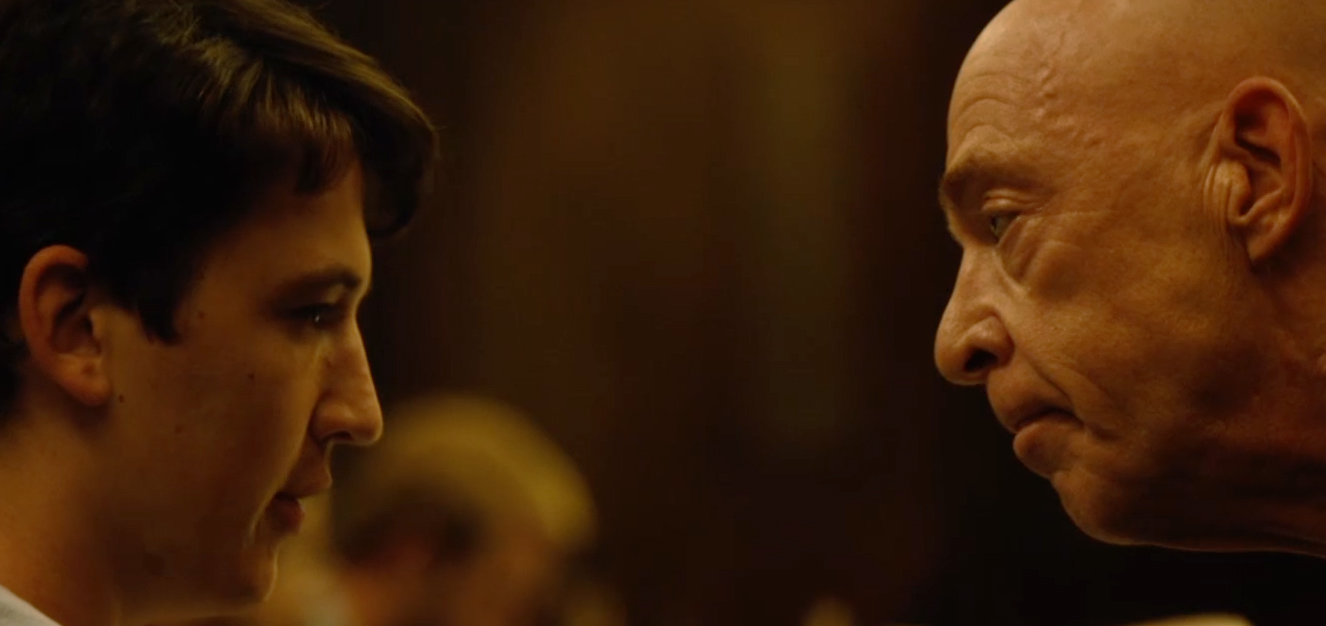
In the realm of artistic endeavour, the term ‘masturbatory’ often refers to displays of virtuosity that are strictly a one-way street; musical genres such as progressive rock, alternative sub genres of hip-hop, and especially jazz being particularly susceptible to such criticism, whether it’s fair or not. On a more juvenile level, charges of artistic masturbation seem especially apt when it involves furious playing of a guitar or drums – an act that doesn’t take a great deal of imagination to make it look like the player is in the throes of self-abuse.
Whiplash opens on such an innuendo, as student Andrew (Miles Teller) practices on a drum kit in a dank-looking room in his campus’ basement, viewed from afar within a grimy corridor, before the camera slowly tracks in on him. The POV, it’s revealed, is of his soon-to-be instructor Fletcher (J.K. Simmons), whose interruption of his session brings to mind nothing so much as a parent catching their child in the midst of onanistic bliss.
It’s an effective opening salvo – part horror film, part comedy of embarrassment – that establishes the tone for a film in which the central pupil-mentor dynamic never resembles music lessons so much as combat training, shadowboxing, sadomasochistic sex, even torture – in short, nothing one would associate with the joy of creativity and collaboration. To its credit, the film is less an inspiring underdog narrative than a tragedy about an intuitive young musician’s transformation into a soulless Energiser Bunny, though such a perspective largely comes down to one’s own personal taste and predilections. Writer/director Damien Chazelle’s achievement is leaving the question of whether the ends justify the means tantalisingly ambiguous.
You’d have to go back a few years to look at Chazelle’s debut feature, Guy and Madeline on a Park Bench (2009) – a low-budget, black-and-white musical romance between a jazz trumpeter and an aimless young woman, with obvious nods to French and American new wave cinema – to see that his passion for jazz, and his faith in its romantic potency is unquestionable.1 In Whiplash, on the other hand, his attitude towards the genre remains inscrutable throughout, in large part due to the college milieu and its formalities (the film is, less ambiguously, a pretty damning portrayal of institutionalised art). The story’s only semblance of romance – between Andrew and a nondescript cute girl he asks out during her shift at a cinema – is tangential, until she becomes a distraction in his single-minded pursuit of excellence and self-discipline.
It’s the film’s weakest and most underdeveloped element, but also leads to its most affecting moment. Having finally reached his limit with Fletcher, Andrew unsuccessfully tries to win her back, semi-earnestly offering that maybe they can both “complain about our schools again” together sometime. It’s an effective throwaway line that casually reinforces Andrew’s own lack of originality, and his dependence on tried-and-true formula rather than genuine inspiration. It also echoes Fletcher’s own repeated invocation of a myth involving Charlie Parker being prodded to greatness following a violent humiliation; his reliance on such lore as justification for his abuse speaking volumes about his own delusions and messiah complex.2
The fear and brutality that drives the music in the film also accounts for why, stylistically, it remains percussive and energetic, if lacking the warmth and spontaneity one associates with ‘jazzy’ filmmaking. Chazelle fills each scene to the brim with insert shots (a split-second glimpse of saliva falling to the feet of a player from a released spit valve is one of the film’s most indelible, tactile images) that divvy his scenes into an overload of sensual and metabolic detail, even before Andrew starts profusely bleeding from splintered sticks.
For all the stress-inducing pain the film depicts, it’s far from an ode to suffering for one’s art – the question of whether the ends justify the means is rendered moot with Andrew’s final, show-stopping performance, which features minimal cutaways to his audience (seen only briefly as an anonymous mass), and pointedly cuts to black, the end credits rolling before they get a chance to (surely) rapturously applaud. Aside from Fletcher and the other band members, there’s only one person seen during this extended set piece – Andrew’s father (played by Paul Reiser), backstage and gawping blankly at his son’s performance. His expression is a mixture of astonishment and horror, as if he sees past the mastery on display for the suffering and degradation that it’s borne of. He’s the closest thing to a surrogate for the viewer, and the success of Whiplash can arguably be measured by how much one is willing to read into his face in the few seconds that it’s glimpsed.
Around the Staff:
| Dominic Ellis | |
| Dominic Barlow | |
| Conor Bateman | |
| Felix Hubble | |
| Brad Mariano | |
| Jess Ellicott |
